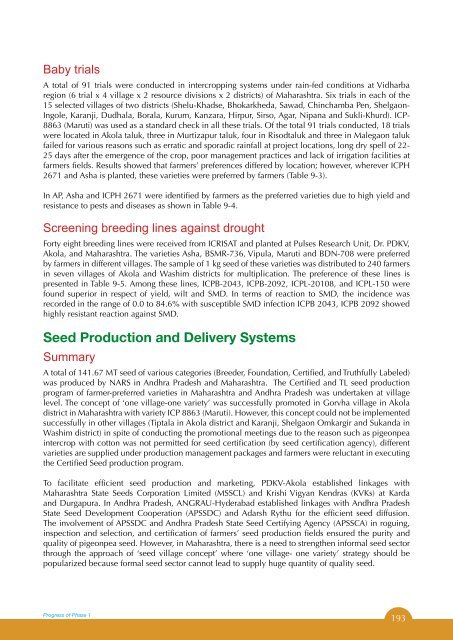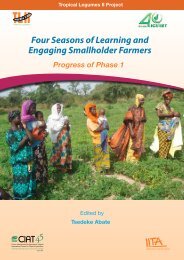Four Seasons of Learning and Engaging Smallholder Farmers - icrisat
Four Seasons of Learning and Engaging Smallholder Farmers - icrisat
Four Seasons of Learning and Engaging Smallholder Farmers - icrisat
Create successful ePaper yourself
Turn your PDF publications into a flip-book with our unique Google optimized e-Paper software.
Baby trials<br />
A total <strong>of</strong> 91 trials were conducted in intercropping systems under rain-fed conditions at Vidharba<br />
region (6 trial x 4 village x 2 resource divisions x 2 districts) <strong>of</strong> Maharashtra. Six trials in each <strong>of</strong> the<br />
15 selected villages <strong>of</strong> two districts (Shelu-Khadse, Bhokarkheda, Sawad, Chinchamba Pen, Shelgaon-<br />
Ingole, Karanji, Dudhala, Borala, Kurum, Kanzara, Hirpur, Sirso, Agar, Nipana <strong>and</strong> Sukli-Khurd). ICP-<br />
8863 (Maruti) was used as a st<strong>and</strong>ard check in all these trials. Of the total 91 trials conducted, 18 trials<br />
were located in Akola taluk, three in Murtizapur taluk, four in Risodtaluk <strong>and</strong> three in Malegaon taluk<br />
failed for various reasons such as erratic <strong>and</strong> sporadic rainfall at project locations, long dry spell <strong>of</strong> 22-<br />
25 days after the emergence <strong>of</strong> the crop, poor management practices <strong>and</strong> lack <strong>of</strong> irrigation facilities at<br />
farmers fields. Results showed that farmers’ preferences differed by location; however, wherever ICPH<br />
2671 <strong>and</strong> Asha is planted, these varieties were preferred by farmers (Table 9-3).<br />
In AP, Asha <strong>and</strong> ICPH 2671 were identified by farmers as the preferred varieties due to high yield <strong>and</strong><br />
resistance to pests <strong>and</strong> diseases as shown in Table 9-4.<br />
Screening breeding lines against drought<br />
Forty eight breeding lines were received from ICRISAT <strong>and</strong> planted at Pulses Research Unit, Dr. PDKV,<br />
Akola, <strong>and</strong> Maharashtra. The varieties Asha, BSMR-736, Vipula, Maruti <strong>and</strong> BDN-708 were preferred<br />
by farmers in different villages. The sample <strong>of</strong> 1 kg seed <strong>of</strong> these varieties was distributed to 240 farmers<br />
in seven villages <strong>of</strong> Akola <strong>and</strong> Washim districts for multiplication. The preference <strong>of</strong> these lines is<br />
presented in Table 9-5. Among these lines, ICPB-2043, ICPB-2092, ICPL-20108, <strong>and</strong> ICPL-150 were<br />
found superior in respect <strong>of</strong> yield, wilt <strong>and</strong> SMD. In terms <strong>of</strong> reaction to SMD, the incidence was<br />
recorded in the range <strong>of</strong> 0.0 to 84.6% with susceptible SMD infection ICPB 2043, ICPB 2092 showed<br />
highly resistant reaction against SMD.<br />
Seed Production <strong>and</strong> Delivery Systems<br />
Summary<br />
A total <strong>of</strong> 141.67 MT seed <strong>of</strong> various categories (Breeder, Foundation, Certified, <strong>and</strong> Truthfully Labeled)<br />
was produced by NARS in Andhra Pradesh <strong>and</strong> Maharashtra. The Certified <strong>and</strong> TL seed production<br />
program <strong>of</strong> farmer-preferred varieties in Maharashtra <strong>and</strong> Andhra Pradesh was undertaken at village<br />
level. The concept <strong>of</strong> ‘one village-one variety’ was successfully promoted in Gorvha village in Akola<br />
district in Maharashtra with variety ICP 8863 (Maruti). However, this concept could not be implemented<br />
successfully in other villages (Tiptala in Akola district <strong>and</strong> Karanji, Shelgaon Omkargir <strong>and</strong> Suk<strong>and</strong>a in<br />
Washim district) in spite <strong>of</strong> conducting the promotional meetings due to the reason such as pigeonpea<br />
intercrop with cotton was not permitted for seed certification (by seed certification agency), different<br />
varieties are supplied under production management packages <strong>and</strong> farmers were reluctant in executing<br />
the Certified Seed production program.<br />
To facilitate efficient seed production <strong>and</strong> marketing, PDKV-Akola established linkages with<br />
Maharashtra State Seeds Corporation Limited (MSSCL) <strong>and</strong> Krishi Vigyan Kendras (KVKs) at Karda<br />
<strong>and</strong> Durgapura. In Andhra Pradesh, ANGRAU-Hyderabad established linkages with Andhra Pradesh<br />
State Seed Development Cooperation (APSSDC) <strong>and</strong> Adarsh Rythu for the efficient seed diffusion.<br />
The involvement <strong>of</strong> APSSDC <strong>and</strong> Andhra Pradesh State Seed Certifying Agency (APSSCA) in roguing,<br />
inspection <strong>and</strong> selection, <strong>and</strong> certification <strong>of</strong> farmers’ seed production fields ensured the purity <strong>and</strong><br />
quality <strong>of</strong> pigeonpea seed. However, in Maharashtra, there is a need to strengthen informal seed sector<br />
through the approach <strong>of</strong> ‘seed village concept’ where ‘one village- one variety’ strategy should be<br />
popularized because formal seed sector cannot lead to supply huge quantity <strong>of</strong> quality seed.<br />
Progress <strong>of</strong> Phase 1<br />
193

















